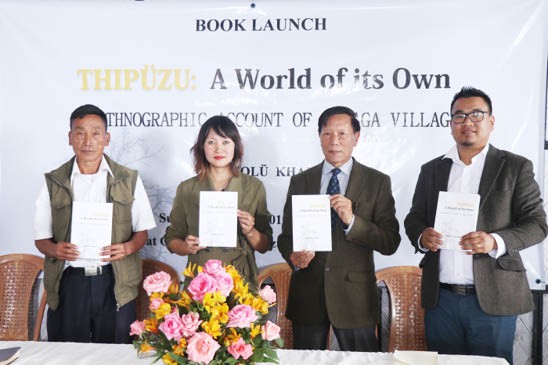From the left Village Council Chairman, Thipüzu, Chorhitso Khamo; author of the book Dr. Sezolü Khamu, Principal Patkai Christian College (Autonomous) Hüsaü Epao and Founder-Director Sustainable Development Research Centre, Rüzaphema, Dr. Mechüselie Kehie. (Photo Courtesy: PCC Department of Mass Communication)

‘Thipüzu: A world of its own, an ethnographic account of a Naga village’
Thipüzu, May 20 (MExN): A breezy sunny weather painting a beautiful scene of the quiet life of Thipüzu, in Phek district of the state of Nagaland saw the village elders and youths marching towards a rustic guest house following the usual Sunday Church service.
Gathered in huge numbers, the elders and village council members were eagerly waiting for history not to be etched 'on stone' but 'in book' for many to know about their world. As was the scene, amidst thunderous applause of the audience the book titled ‘Thipüzu: A world of its own, an ethnographic account of a Naga village’ was launched by Principal Patkai Christian College (Autonomous) Hüsaü Epao on Sunday at Thipüzu guest house here.
Much to the delight of the villagers on the occasion, the book authored by Dr. Sezolü Khamu and published under the banner of Whetstone Publication was dedicated to all the generations of Thipüzumi. As such finding a solid place among the people of the village, the book is an attempt to cover in brief as many instances that speaks of the life in and about Thipüzu. Dr. Khamu in her newly launched book writes, “We are witnessing an increasing departure from the cognizance of our roots. A substantial share of age-old knowledge has survived but it is lamentable that much of the invaluable cultural heritage have disappeared”.
Speaking on the occasion, Dr. Khamu informed that the journey to document the village life in the form of a monograph started way back in July 2016. Reminiscing over the journey, the author credited the elders of the village who had helped her with unique narratives of the past; which otherwise would have been impossible to find, she added.
The author stressing on the importance of village ethnographies considering the uniqueness of each village said, “It is in taking pleasure in the fascination of the past and the concern for the fast fleeting culture that have inspired me to come up with this monograph.” She also dwelled upon how anthropologists started to shift their attention from typical monographic study of tribes and concentrated on villages when WWII came to a close. Speaking about the core theme of the book, she said “Each village has its own distinctive cultural heritage as such it is important to document each village as a distinctive entity”.
As special guest, Principal PCC, Hüsazü Epao congratulating the author said that it is a ‘must read’ book for students, scholars and others who wish to know about a Naga village. Stating that the book is a well researched piece, he urged upon everyone to have a copy of the book in order to show it to guests from outside visiting their village. Impressed by the author’s effort, Epao said that the decision to launch the book in the village about which the book is; reflects the author’s and publisher’s genuine acknowledgement of the villagers and the village.
Founder-Director Sustainable Development Research Centre, Rüzaphema, Dr Mechüselie Kehie in his introductory and publisher’s note underscored the significance of documenting the fast eroding cultural heritage of the Naga people. He further stated that the book can be a strong medium to pass on the oral tradition and act as historical account of the traditions followed by generations. Adding that the richness of a cultural heritage cannot be limited to one book, he encouraged writers and authors to come forward.
He also informed that after the primary collections of the data, a meeting was held with the village council and research committee of the village which was then approved and authenticated by both. It is pertinent to mention here that the village has a research committee where the villagers can volunteer to share distinct narratives in order to be documented.
Village Council Chairman, Thipüzu, Chorhitso Khamo and gaon bura Zacutso Thelu-O also spoke on the occasion. The prayer was pronounced by pastor, Thipüzu Baptist Church and the vote of thanks was given by Chekropalü Khamu.





